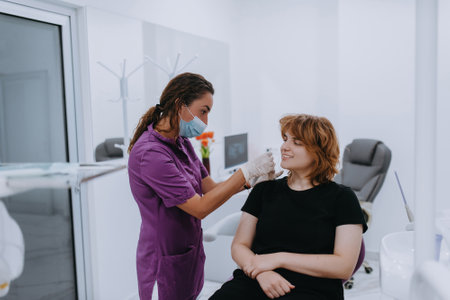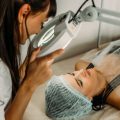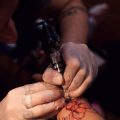1. Understanding Rosacea: A Brief Overview
Rosacea is a chronic skin condition that primarily affects the face, and it’s far more common in the UK than many might think. Typically, rosacea presents as persistent redness, visible blood vessels, and occasional spots or bumps that may resemble acne. Some people may also experience sensations of burning or stinging, especially when exposed to triggers like extreme temperatures, spicy foods, or stress—a familiar challenge given the unpredictable British weather. While rosacea can affect anyone, it’s most frequently seen in adults with fair skin, which includes a significant proportion of the UK population. Living with rosacea can impact self-confidence and everyday comfort, making it important to understand both its symptoms and how it specifically affects those living in the UK’s unique climate and cultural environment.
Cosmetic Procedures for Rosacea: What Are Your Options?
When it comes to rosacea, many people in the UK are understandably cautious about which cosmetic treatments are both effective and safe. While there is no cure for rosacea, a range of cosmetic procedures can help manage its visible symptoms—especially persistent redness, visible blood vessels, and skin texture changes. Understanding your options can empower you to make informed decisions with confidence and care. Below is an overview of the most commonly discussed or available treatments at UK clinics:
| Treatment | How It Works | Common Use in UK | Suitability for Rosacea |
|---|---|---|---|
| Laser Therapy (e.g., Pulsed Dye Laser) | Targets and reduces visible blood vessels and redness | Widely offered by dermatologists and medical aesthetic clinics | Effective for persistent redness; not suitable during flare-ups |
| Intense Pulsed Light (IPL) | Uses broad-spectrum light to address redness and pigmentation | Popular and accessible; requires trained practitioners | Can help with flushing and visible veins; patch testing recommended |
| Chemical Peels (Gentle/Azelaic Acid) | Removes superficial skin layers to improve texture and tone | Available in specialised clinics; gentle formulations preferred | Mild peels may be tolerated; strong acids usually avoided |
| Microneedling | Tiny needles stimulate collagen production and skin healing | Growing in popularity; often performed by qualified professionals | May improve texture but could irritate sensitive rosacea skin |
| LED Light Therapy (Red/Blue Light) | Non-invasive light therapy to reduce inflammation and bacteria | Frequently available in beauty salons and clinics across the UK | Generally safe and soothing; best for mild cases or maintenance |
| Dermal Fillers & Botox | Smooths wrinkles or reduces facial muscle movement | Common cosmetic services in the UK | No direct benefit for rosacea symptoms; caution if skin is inflamed |
Your Next Steps in Choosing a Treatment
If you’re considering a cosmetic procedure for rosacea, always consult a qualified dermatologist or medical practitioner familiar with rosacea management. Not every treatment suits every skin type, and what works for one person may not be appropriate for another—especially given the sensitivity typical of rosacea-prone skin. Remember, the best results often come from a blend of professional guidance, realistic expectations, and gentle self-care. Your journey towards calmer, more confident skin begins with knowledge, so take your time exploring your options.

3. Procedures Considered Safe for Rosacea-Prone Skin
If you are living with rosacea, it is natural to feel cautious about cosmetic procedures. Fortunately, several treatments have been recognised as safe and effective for those with sensitive, rosacea-prone skin in the UK. Among the most popular options are laser therapy and intense pulsed light (IPL), both of which are widely available across reputable clinics.
Laser Therapy: A Gentle Approach
Laser therapy, especially vascular lasers such as the pulsed dye laser (PDL), targets visible blood vessels and persistent redness—two common rosacea symptoms. This treatment is approved in the UK and is performed by trained professionals who tailor their approach to your skin’s unique needs. British dermatologists value laser therapy for its precision and its minimal downtime, making it a trusted choice for many people managing rosacea.
Intense Pulsed Light (IPL): Broad-Spectrum Relief
IPL uses multiple wavelengths of light to address redness, flushing, and visible veins associated with rosacea. It is considered safe when administered by experienced practitioners who understand how to adjust settings specifically for sensitive skin types. IPL has grown in popularity throughout the UK due to its non-invasive nature and consistent results. Clinics registered with the Care Quality Commission (CQC) or similar regulatory bodies ensure high safety standards.
Why Safety Matters in Cosmetic Treatments
Choosing a procedure that is both safe and effective can make a significant difference in your confidence and skin health. In the UK, strict regulations and professional guidelines help protect individuals seeking cosmetic treatments for rosacea. Always seek out practitioners who specialise in treating rosacea and are familiar with the nuances of British skin types and sensitivities.
Prevalence and Accessibility in the UK
Laser and IPL therapies are widely accessible across major UK cities, from London to Manchester to Edinburgh. Many NHS dermatology departments may offer advice or referrals, though most cosmetic treatments remain private services. With growing awareness of rosacea-friendly procedures, you can feel reassured that safe options are not only available but increasingly commonplace throughout the country.
4. Treatments to Approach with Caution or Avoid
While the UK offers a wide range of advanced cosmetic procedures, not all are suitable for those living with rosacea. It’s important to be discerning and aware that certain popular treatments can aggravate sensitive skin, leading to flare-ups, prolonged redness, or even permanent damage. Below, we’ve highlighted some procedures and trends commonly available across the UK that are best approached with caution—or avoided altogether if you have rosacea.
| Treatment | Why Caution is Needed | Potential Risks for Rosacea |
|---|---|---|
| Chemical Peels (High-Strength) | These often use strong acids which can strip and irritate already-sensitive skin. | Severe redness, burning, increased sensitivity, worsening of rosacea symptoms. |
| Microdermabrasion & Abrasive Facials | This mechanical exfoliation can be too harsh for rosacea-prone skin, disrupting the skin barrier. | Broken capillaries, inflammation, persistent irritation. |
| Hot Stone Facials & Steam Treatments | Excess heat dilates blood vessels and may trigger flushing episodes. | Increased redness, potential for more frequent flare-ups. |
| Microneedling (without medical supervision) | If not performed by a professional with experience in rosacea, it can worsen inflammation. | Pain, swelling, infection risk, exacerbation of symptoms. |
| Aggressive Laser Treatments | Certain lasers are too intense and may damage delicate skin unless tailored for rosacea. | Burns, hyperpigmentation, scarring. |
Why is safety such a concern?
The British climate and culture value a natural look and gentle skincare routines; aggressive treatments often contradict this ethos. Rosacea skin is particularly vulnerable to trauma—whether from harsh chemicals, abrasive textures, or excessive heat. Any procedure that causes significant irritation or disrupts the skin’s protective barrier can make symptoms worse. It’s always wise to consult with a UK-based dermatologist who understands both your skin condition and the best local practices before undergoing any new cosmetic treatment. By choosing gentler options and avoiding high-risk procedures, you’ll protect your skin’s health—and your confidence—for the long term.
5. Choosing the Right Practitioner in the UK
When considering cosmetic procedures for rosacea, selecting a qualified practitioner is absolutely crucial—especially in the UK, where regulations ensure patient safety and high standards of care. Your confidence and comfort should always come first, so never feel rushed or pressured into making a decision. Start by seeking out clinics and practitioners who are registered with professional bodies such as the General Medical Council (GMC) for doctors, or the Nursing and Midwifery Council (NMC) for nurses. For non-surgical treatments like laser or IPL, look for membership with reputable organisations such as the British Association of Dermatologists or Save Face. These accreditations signal that practitioners adhere to strict safety protocols and ongoing professional development.
Why Patch Testing Matters
A responsible practitioner will always recommend a patch test before any treatment, particularly if you have sensitive, rosacea-prone skin. Patch testing is a small but essential step—it involves applying a tiny amount of the product or using a brief pulse of energy to an inconspicuous area of your skin. This helps to identify any potential allergic reactions or sensitivity issues before proceeding with full treatment. Never skip this stage; your skin’s wellbeing deserves patience and thoroughness.
The Importance of Consultation
Consultations are more than just formalities—they are your opportunity to discuss your unique skin concerns, ask questions about various procedures, and set realistic expectations. A reputable UK practitioner will conduct a detailed assessment of your skin type and medical history, explaining all possible risks and benefits specific to rosacea patients. Don’t hesitate to ask about their experience with rosacea, request before-and-after photos, or seek testimonials from previous clients. Remember: feeling listened to and respected is just as important as clinical expertise.
Your Safety Is Paramount
Ultimately, choosing the right practitioner means prioritising your health and self-confidence above all else. Take your time researching, don’t be afraid to walk away if something doesn’t feel right, and trust your instincts. The UK offers many excellent options for rosacea-friendly cosmetic procedures—ensure you’re in expert hands so you can enjoy safe, effective results tailored to your needs.
6. Post-Procedure Care and Support
After undergoing cosmetic procedures for rosacea in the UK, diligent post-procedure care is essential for achieving the best results and maintaining your skin’s health. According to NHS guidance and recommendations from leading UK dermatologists, it’s important to treat your skin with extra gentleness in the days and weeks following treatment. You may be advised to use mild, non-perfumed cleansers and moisturisers, avoid hot water, and strictly shield your face from sun exposure by using high-factor SPF sunscreen daily. It’s also common to experience temporary redness or sensitivity after certain treatments—don’t worry, this is a normal part of the healing process.
What to Expect After Cosmetic Procedures
Your practitioner will provide tailored aftercare instructions, but some universal tips include avoiding harsh skincare products (like retinoids or exfoliants), not picking at the skin, and steering clear of saunas or strenuous exercise for a few days. The NHS stresses the importance of monitoring for signs of infection or unexpected reactions; if you notice severe pain, swelling, or blistering, contact your provider promptly.
Long-Term Rosacea Management
Even after successful cosmetic intervention, rosacea requires ongoing management. Consider keeping a diary to identify personal triggers—such as spicy foods, alcohol, temperature extremes, or stress—and work with your GP or dermatologist to adjust your routine accordingly. The NHS also offers advice lines and online resources to help you stay informed about rosacea care and flare-up prevention.
Local Support Networks
If you’re seeking additional support, several UK-based organisations—such as the British Association of Dermatologists and the National Rosacea Society—offer practical guidance and community forums. Many NHS clinics host group education sessions or one-to-one consultations with specialist nurses who understand rosacea’s unique challenges. Remember: you’re not alone on this journey. With professional care and local support, you can embrace both confidence and comfort in your skin.


